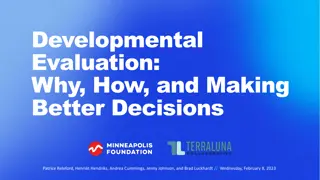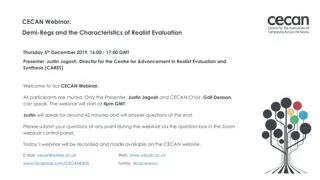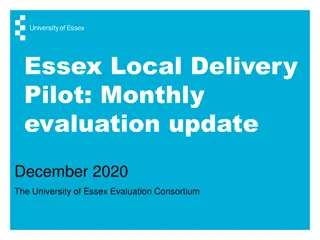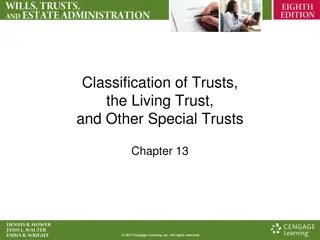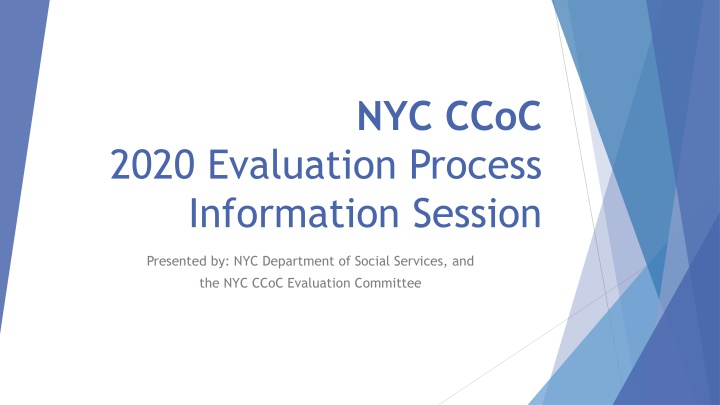
NYC CCoC 2020 Evaluation Process Overview
Learn about the evaluation process for the NYC Continuum of Care (CCoC) in 2020, including timelines, changes, appeals, and more. This detailed information session is presented by the NYC Department of Social Services and the NYC CCoC Evaluation Committee.
Download Presentation

Please find below an Image/Link to download the presentation.
The content on the website is provided AS IS for your information and personal use only. It may not be sold, licensed, or shared on other websites without obtaining consent from the author. If you encounter any issues during the download, it is possible that the publisher has removed the file from their server.
You are allowed to download the files provided on this website for personal or commercial use, subject to the condition that they are used lawfully. All files are the property of their respective owners.
The content on the website is provided AS IS for your information and personal use only. It may not be sold, licensed, or shared on other websites without obtaining consent from the author.
E N D
Presentation Transcript
NYC CCoC 2020 Evaluation Process Information Session Presented by: NYC Department of Social Services, and the NYC CCoC Evaluation Committee
Table of Contents I. Introduction/Background II. Review of Timeline III. 2020 CCoC Evaluation Similarities/What s the Same What s New IV. Appeals V. Questions
I. Introduction/Background Each year, HUD releases the Notice of Funding Availability (NOFA) that details application funding requirements. One requirement of the NOFA is that each application evaluate and rank programs. In 2012, the CoC voted to align the Evaluation Tool to HUD standards in order to maximize the CoC ranking nationally. Annually, the Evaluation Tool is reviewed and updated by the NYC CCoC Evaluation Committee based on: Current HUD priorities and standards Lessons Learned from the prior year Evaluation on how to improve the tool for user friendliness, relevance, question clarity, and performance measurement For the 2020 Evaluation, the CoC adopted the 2019 Tool to facilitate automated programming, and made some changes to the Local Priorities Survey to make the Evaluation process easier and more transparent
II. 2020 Evaluation Process Timeline Activity Deadline Evaluation Committee meeting to review Recommended Changes to 2020 Evaluation Approval of HMIS Evaluation Tool, SurveyMonkey Local Priorities Evaluation Survey (i.e. Non-HMIS Sourced information), and Instructions/Process document by Steering Committee via electronic vote SurveyMonkey Local Priorities Evaluation Survey + Automated HMIS Evaluation Tool Opens for Data Collection Projects selected for Audit are notified Evaluation Information Session available for Provider viewing 2020 Evaluation Instructions, FAQs, and hard copies of SurveyMonkey Local Priorities Evaluation Survey, Automated HMIS Evaluation Tool, and Information Session presentation distributed November 2019 (Complete) November 2019 (Complete) December 3, 2019 December 3, 2019 December 3, 2019 December 3, 2019 Week of December 2nd, 2019 and December 9th,2019 NYC DSS Evaluation Office Hours for Evaluation Q&A SurveyMonkey Online Evaluation Survey Due (with audited projects to include verification documents) Friday, December 27, 2019 Data populated in Automated HMIS Evaluation Tool Due Audit Begins Data Adjustment Period begins (Opportunity for Providers to make data corrections in HMIS and inform NYC DSS that changes have been made and/or alert them to errors. Providers need not wait until this time they can and should be cleaning up their data so that their Preliminary Results are reflective of data accuracy and completeness.) Monday, December 30, 2019 Monday, December 30, 2019
2020 Evaluation Process Timeline (contd) Activity Deadline Preliminary Results Friday, January 3, 2020 Debrief Call on Preliminary Results Week of January 6, 2020 Data Adjustment Period Ends Audit Ends Data Adjustment Period Ends Updated Preliminary Results (applies only if Data Adjustments made, but all scores will be published even if no change) Due COB Friday, January 25, 2020 Friday, January 24, 2020 Friday, January 24, 2020 Monday, January 27, 2020 Provider Appeals of Evaluation Score Due COB Friday, February 7, 2020 Program Notified on Status of Appeals Friday, February 14, 2020 Final Evaluation Results Friday, February 21, 2020
III. 2020 CCoC Evaluation Similarities to last year: What has remained the same* The HMIS Tool has functionally and structurally remained the same. It can be accessed through the HMIS Data Warehouse (nychmis.footholdtechnology.com; Administration Fiscal - NYC CoC Evaluation Tool.) Contact Michael Brydges (brydgesm@dss.nyc.gov) if you need a User ID and/or Password. Additional details on how to use the Automated HMIS Tool are included in Section IX of the Evaluation Instructions document. A tutorial can also be found here: https://youtu.be/s5s7GWjSInU The HMIS Tool enables projects to directly check the points they will receive on the HMIS-sourced metrics of the Evaluation. Providers should use this report as a self-monitoring tool throughout the year not just during the Evaluation period - and it is recommended that it be reviewed on a quarterly basis at minimum. It is also a way to double-check what is in HMIS - Providers and DSS can now view the same data. The CoC also adopted the same Process Instructions and Survey administered via SurveyMonkey. There hasn t been a major overhaul to either of these documents. Data is being reviewed directly from the HMIS Data Warehouse Scores are not curved The Data Adjustment Period and Audit are back! There will be a formal appeals process to resolve scoring disputes. * Please see the 2020 Evaluation Instructions for full details
III. 2020 CCoC Evaluation What s New?* Based on Provider feedback from the 2019 Evaluation, several components have been streamlined and clarified. For example: Evaluation period shorter by 3 weeks Information Sessions conducted via webinar RRH and TH-RRH projects being evaluated for the first time Additional clarification around the Appeals process The 2020 Local Priorities Survey also has some changes. For example: 22 points (17 in previous years) SOAR and Environmental Review questions now scored Modification of the benchmark and score range for the Spend-Down question Four non-scored questions on NYC CAPS * Please see the document 2020 NYC CCOC Project Evaluation Changes Highlights and the 2020 Evaluation Instructions for full details
IV. Appeals Determine whether your disagreement falls in to the category of an appeal or can be addressed during the data adjustment period Example 1: Your project did not receive the full 15 points for Q1. Utilization on the HMIS Tool for its Preliminary Score. You feel that utilization should be calculated based on a monthly utilization, not the 4 point-in-time counts over the course of the calendar year. Data Adjustment or Appeal? Answer: Neither. This is a HUD requirement that cannot be changed. Example 2: Your project did not receive the full 15 points for Q1. Utilization on the HMIS Tool for its Preliminary Score. There was an offline unit in July 2019 as a result of a fire. FDNY/NYPD will not let you rent-out the unit and you notified NYC CCoC within two months of this event. Data Adjustment or Appeal? Answer: Data Adjustment. Contact Cadija or Charlie, via email, explain the situation, and provide supporting documentation (e.g. an email correspondence or letter from FDNY/NYPD stating the units cannot be accessed.) Example 3: Your project did not receive the full 15 points for Q1. Utilization on the HMIS Tool for its Preliminary Score. Your building was undergoing a minor renovation starting in March 2019, resulting in 3 units being taken offline. You did not notify the CCoC or the NYC DSS HMIS Team because the renovation was going to be completed by April 1stand you anticipated renting up those 3 units immediately thereafter. The renovation was not completed until May 1stand so your project lost points for the April point-in-time count for Utilization. You feel that in this particular case, because your utilization has consistently been 100% for several years and this was just an off year /contractor delays were out of your control, that your project should either be exempted (i.e. given full credit) or that the utilization should be calculated over the course of the year resulting in 97% utilization. Data Adjustment or Appeal? Answer: Appeal Example 4: Your project did not receive full points on Q.8-10 Spend-Down on the Local Priorities Survey for its Preliminary Score. You believe this is an error and have documentation from LOCCS to demonstrate the entire grant was spent, including Admin, and on a quarterly basis. Data Adjustment or Appeal? Answer: Data Adjustment just provide Charlie or Cadija with the documentation from LOCCS. You re not sure whether your question falls under Data Adjustment or Appeal because it pertains to a Question that has been debated for the past several years, and is being investigate, but hasn t been resolved yet. Example 1: Your project consistently scores poorly on the Q.8 Spend-Down on the Local Priorities Survey because of restrictions around tenant contributions to rent and fluctuating tenant income. Data Adjustment or Appeal? Answer: Appeal Example 2: Your project consistently scores well on Q.5 Earned Income on the HMIS Tool but poorly on Q.6 Other Income because clients are not eligible for the latter as a result of exceeding the income cap. Data Adjustment or Appeal? Answer: Appeal Accurately complete the Appeals Form on p.27 of the 2020 Evaluation Instructions. Incomplete information, inaccurate information, and late submission could result in disqualification. * Please see the document 2020 NYC CCOC Project Evaluation Changes Highlights and the 2020 Evaluation Instructions for full details
V. Questions? * Please see the NYC CCoC 2020 Evaluation: Answers to FAQs for full details
Contacts NYC CCoC team email: nycccoc@dss.nyc.gov Charlie Winkler, Deputy Director, Federal Homeless Policy & Reporting Unit, NYC DSS Phone: 929-221-6187 Email: winklerc@dss.nyc.gov Cadija Tibbs, Policy Analyst, Federal Homeless Policy & Reporting Unit, NYC DSS Phone: 929-221-6911 Email: tibbsca@dss.nyc.gov Michael Brydges, HMIS Analyst, Federal Homeless Policy & Reporting Unit, NYC DSS Phone: 929-221-6278 Email: brydgesm@dss.nyc.gov







